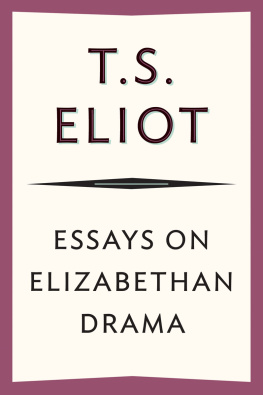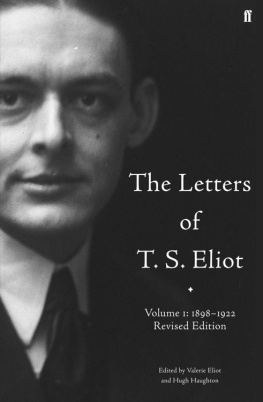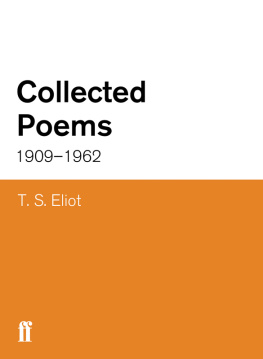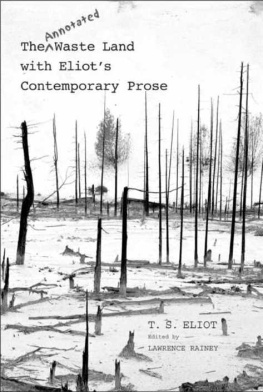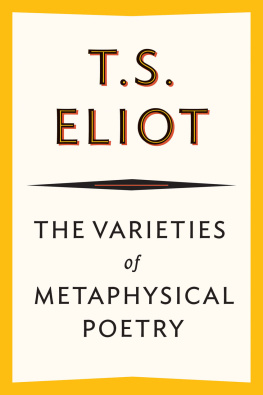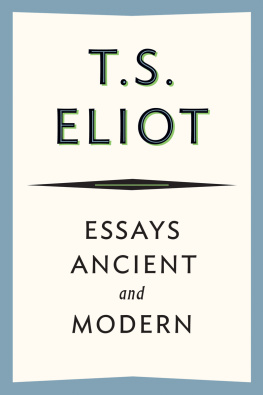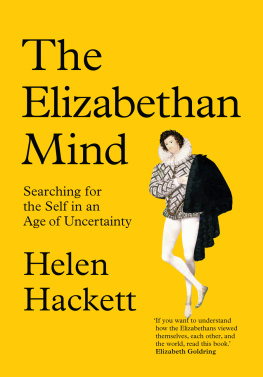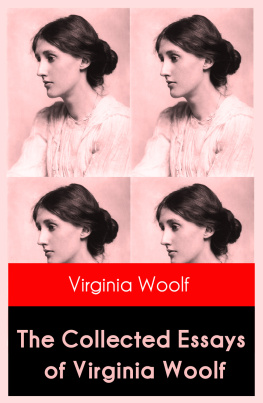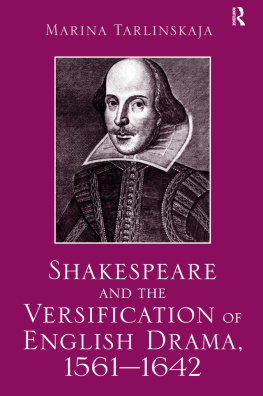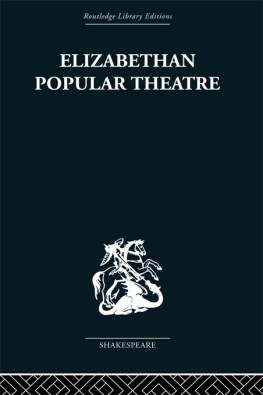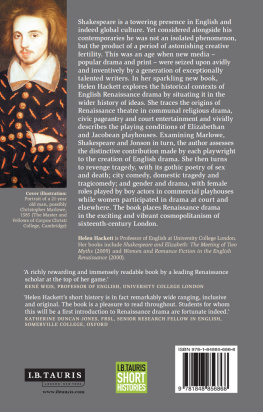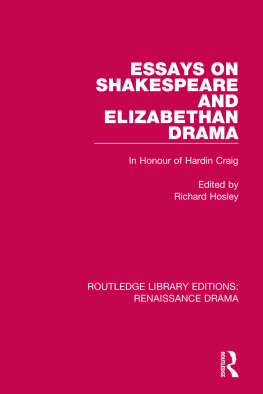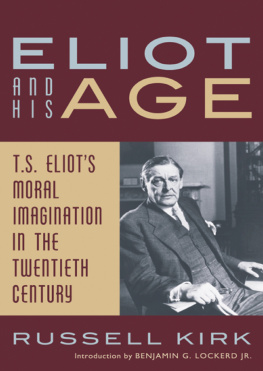T. S. Eliot - Essays On Elizabethan Drama
Here you can read online T. S. Eliot - Essays On Elizabethan Drama full text of the book (entire story) in english for free. Download pdf and epub, get meaning, cover and reviews about this ebook. year: 2014, publisher: HarperCollins, genre: Detective and thriller. Description of the work, (preface) as well as reviews are available. Best literature library LitArk.com created for fans of good reading and offers a wide selection of genres:
Romance novel
Science fiction
Adventure
Detective
Science
History
Home and family
Prose
Art
Politics
Computer
Non-fiction
Religion
Business
Children
Humor
Choose a favorite category and find really read worthwhile books. Enjoy immersion in the world of imagination, feel the emotions of the characters or learn something new for yourself, make an fascinating discovery.
- Book:Essays On Elizabethan Drama
- Author:
- Publisher:HarperCollins
- Genre:
- Year:2014
- Rating:4 / 5
- Favourites:Add to favourites
- Your mark:
- 80
- 1
- 2
- 3
- 4
- 5
Essays On Elizabethan Drama: summary, description and annotation
We offer to read an annotation, description, summary or preface (depends on what the author of the book "Essays On Elizabethan Drama" wrote himself). If you haven't found the necessary information about the book — write in the comments, we will try to find it.
Essays On Elizabethan Drama — read online for free the complete book (whole text) full work
Below is the text of the book, divided by pages. System saving the place of the last page read, allows you to conveniently read the book "Essays On Elizabethan Drama" online for free, without having to search again every time where you left off. Put a bookmark, and you can go to the page where you finished reading at any time.
Font size:
Interval:
Bookmark:
COPYRIGHT , 1932, 1956, BY
HARCOURT, BRACE AND COMPANY, INC .
All rights reserved, including the right to reproduce this book or portions thereof in any form.
For information about permission to reproduce selections from this book, write to Permissions, Houghton Mifflin Harcourt Publishing Company, 215 Park Avenue South, New York, New York 10003.
www.hmhco.com
Library of Congress Cataloging-in-Publication data is on file.
e ISBN 978-0-544-35704-4
v1.0214
IN MEMORIAM
DONALD BRACE
When it was suggested that I should make, for inclusion in the Harvest series, a selection of essays from the selection of my essays published under the title of Selected Essays, my first thought was to reprint a small selection published many years ago in England, called Elizabethan Essays. With this aim in view, it seemed prudent to reread these essays, at most of which I had not looked, I suspect, since I read the proof for that book. The result was somewhat surprising.
Two of the essays were concerned with Shakespeare: Shakespeare and the Stoicism of Seneca and Hamlet and His Problems. A third was entitled Four Elizabethan Dramatists with the somewhat pretentious subtitle Preface to an Unwritten Book. All three of these essays on re-examination embarrassed me by their callowness, and by a facility of unqualified assertion which verges, here and there, on impudence. The Hamlet, of course, had been kept afloat all these years by the success of the phrase objective correlativea phrase which, I am now told, is not even my own but was first used by Washington Alston. These three essays were the first to be reread; and when I had read them I turned with trepidation to reread my essays on Shakespeares contemporaries. I was astonished to find that these essays struck me as very good indeed.
What is the reason for my forming such different judgments on different essays? I believe that the explanation is at least partly to be found in the fact that Shakespeare is so much greater than any of his contemporaries. About Marlowe, or Ford, or even Ben Jonson, it is possible for a young man (and I was a very young man, or an immature youngish man, when I wrote these essays) to have something to say with which he will still find himself in agreement thirty years or more later. It may even be that a youthful sensibility is the most desirable qualification for writing about these minor poets and dramatists. Mature wisdom, and much experience of men and books, is perhaps unnecessary for the appreciation of their work. But, for the understanding of Shakespeare, a lifetime is not too long; and of Shakespeare, the development of ones opinions may be the measure of ones development in wisdom.
However this may be, I have rejected these three essays in compiling this book. Instead, I have included Seneca in Elizabethan Translation, which seems to me to deserve its place as the first essay in Elizabethan drama. Like the other essays, it contains some good quotations. And that perhaps is another reason why it is easier to write about minor Elizabethan and Jacobean drama than about Shakespeare: an essay can be worth reading for the quotations alone. Quotations from Shakespeare are too well known; it is not enough to quote well; the critic must have something worth saying about his quotations from Shakespeare.
I call the attention of students of Elizabethan drama to the fact that the date of each essay is given in the Table of Contents. This is a practice I like to observe in printing any collection of essays; but it is peculiarly important where the critical judgments may depend on the conclusions of current scholarship. It may well be that later scholarly research has disproved assumptions which I then accepted. On the other hand, if in discussing any dramatist I have ignored any work of scholarship with which I should have been acquainted when I wrote about him, I shall expect my criticism to be marked down accordingly.
On the whole, I think that these essays do provide a helpful introduction to the study of the poetic drama of the age of Elizabeth I and James I, and to the very interesting differentia of temperament and technique between the dramatists. There are two conspicuous omissions. I do not so much regret the absence of an essay on the work of John Webster: a great deal has been written on this subject, two of his plays are very well known and are from time to time performed, and I have alluded constantly to Webster in discussing other dramatists. But I very much regret the fact that I did not, during that period of my life at which these essays were written, have occasion to write about the work of that very great poet and dramatist, George Chapman. It is too late now: to attempt to repair such a gap, after many years neglect, would be almost as futile as to attempt to remove the blemishes (of which one is aware) in ones early poems. The most remarkable appreciation of Chapman in my time (works of scholarship apart) is to be found in The Lion and the Fox by Wyndham Lewis.
I have included one essay, that on John Marston, which was written just too late for inclusion in Elizabethan Essays. I have dedicated the present book to the friend and publisher who introduced Selected Essays to the American reader in 1932; but I should like to express a debt of gratitude also to the late Charles Whibley, who commissioned Seneca in Elizabethan Translation as an introduction in the Tudor Translation Series; and to Sir Bruce Lyttelton Richmond, at whose behest, when he was editor of The Times Literary Supplement, I wrote most of the essays on individual dramatists.
T.S.E.
December 1955.
No author exercised a wider or deeper influence upon the Elizabethan mind or upon the Elizabethan form of tragedy than did Seneca. To present the Elizabethan translations of the tragedies in their proper setting, it is necessary to deal with three problems which at first may appear to be but slightly connected: (1) the character, virtues, and vices of the Latin tragedies themselves; (2) the directions in which these tragedies influenced our Elizabethan drama; (3) the history of these translations, the part they played in extending the influence of Seneca, and their actual merit as translation and as poetry. There are here several questions which, with the greater number of important Tudor translations, do not arise. Most of the better-known translations are of authors whose intrinsic merit is unquestioned, and the translations derive some of their prestige from the merit and fame of the author translated; and most of the better-known prose translations have an easy beauty of style which arrests even the least prepared reader. But with the Elizabethan translations of the Tenne Tragedies (for they are by several hands) we are concerned first of all with a Latin poet whose reputation would deter any reader but the most curious; with translations of unequal merit, because by different scholars; and with translation into a metrethe fourteenerwhich is superficially a mere archaism, and which repels readers who have not the patience to accustom their ears and nerves to its beat. The translations have, as I hope to show, considerable poetic charm and quite adequate accuracy, with occasional flashes of real beauty; their literary value remains greater than that of any later translations of Senecas tragedies that I have examined, either in English or French. But the appreciation of the literary value of these translations is inseparably engaged with the appreciation of the original and of its historical importance; so that although at first sight a consideration of the historical problems may appear irrelevant, it should in the end enhance our enjoyment of the translations as literature.
Next pageFont size:
Interval:
Bookmark:
Similar books «Essays On Elizabethan Drama»
Look at similar books to Essays On Elizabethan Drama. We have selected literature similar in name and meaning in the hope of providing readers with more options to find new, interesting, not yet read works.
Discussion, reviews of the book Essays On Elizabethan Drama and just readers' own opinions. Leave your comments, write what you think about the work, its meaning or the main characters. Specify what exactly you liked and what you didn't like, and why you think so.

